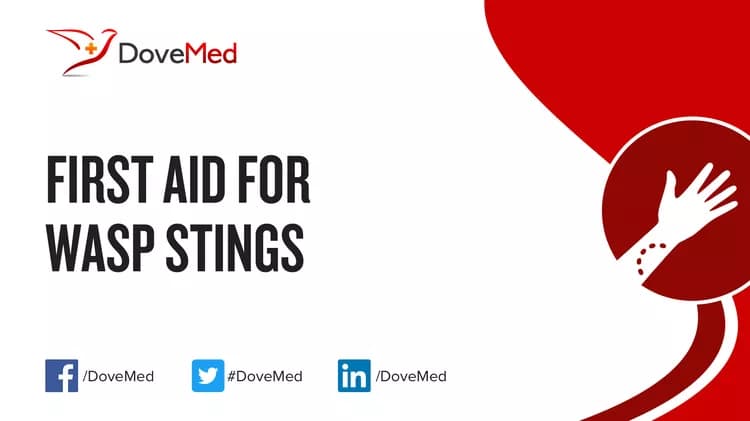What are Wasp Stings?
- Wasps are flying insects found all over the world that are important for their role as natural pest controllers in agriculture farms and fields. Some wasps are social insects, while a majority of them lead a solitary life
- Some of the common and aggressive ones that sting include the vespid wasps, the yellow jackets, the potter wasps, the European hornets, and Asian giant hornets
- Wasp Stings can be very painful and produce allergic reactions in some individuals. In some cases, this may be severe and deadly
Wasp Stings may be also referred to as the following:
- Hornet Poisoning
- Wasp Poisoning
- Wasp Venom Poisoning
What are the Causes of Wasp Stings?
- Wasp Stings occur following exposure to wasps. Most species of wasps are typically aggressive and will sting on the slightest provocation
- The wasp venom is alkali in nature and typically contain a mixture of proteins that attacks the nervous system
- Some wasps are known to release certain chemicals (called pheromones) while stinging, which incite other wasps to attack/sting. These chemicals do not get wiped-off or washed-off easily, resulting in a continued attack
What are the Signs and Symptoms of Wasp Stings?
The signs and symptoms of Wasp Stings depend on whether the stings are few or numerous, and on the type of reaction that develops in the individual. These may include:
- At the area of the sting:
- Burning sensation and immediate sharp pain that may be very severe
- Itchiness
- Swelling and redness of skin
- The skin inflammation may increase in size after a few days
- In case of intense scratching, it may lead to an infection
- Nausea and vomiting
- Diarrhea
- Stomach muscle cramping
- Fever
- Lowered blood pressure (hypotension)
- In case of a severe allergic reaction (anaphylaxis), the following may be observed:
- Severe sweating
- Breathing difficulties
- Increased heart rate
- Swollen mouth, lips, tongue, and throat, which may further lead to swallowing and speaking difficulties
- Flushing of skin, hives
- Collapse and unconsciousness
Multiple stings by a colony of wasps may result in severe symptoms, especially in those with certain underlying heart conditions, the elderly adults and in young children. In such cases, prompt medical attention is necessary and important.
How is First Aid administered for Wasp Stings?
First Aid tips for Wasp Stings:
- Move the individual away from the area of exposure, as safely as possible
- If allergy to wasp poison is present/known and the individual is carrying prescription epinephrine medication on him/her, it should be administered immediately
- Repeatedly wash the sting area with soap and water. Typically, Wasp Stings do not cause the stingers to be torn and embedded into the wound/sting site
- Put an icepack or ice wrapped in cloth on the affected area; place the icepack for 10 minutes on the site and then break (wait) for 10 minutes (to avoid skin tissue damage from ice). Repeat this process several times
- Take an antihistamine drug, such as diphenhydramine, to prevent an allergic reaction (for mild cases ONLY)
- DO NOT use any home remedies/preparations (such as vinegar, soda, etc.) on the affected region
- DO NOT take any pain medications, such as Aspirin, unless recommended by a physician
- DO NOT use a tourniquet on the affected area
- Look out for any signs of infection
- Call the Poison Control Center at 1-800-222-1222 (or your local poison control center) for further instructions
In case of an allergic reaction (anaphylaxis), immediately call 911 or your local emergency help number. Until emergency help arrives, the following may be considered:
- Help the affected individual take medication for allergy reaction, such as epinephrine, if he/she is prescribed the drug and is in possession of the same
- After injecting epinephrine, give the individual an antihistamine pill
- Lie down the victim with legs slightly elevated than the head
- If the victim is vomiting, turn them onto their side
- If the victim is not breathing or there is no movement, immediately begin CPR
- If possible, take the insect (or parts of it) to the healthcare facility for identification
Who should administer First Aid for Wasp Stings?
The individual who is affected or someone near should administer initial first aid, following which one should seek medical help. In case of anaphylaxis, call 911 or your local emergency number immediately.
What is the Prognosis of Wasp Stings?
- The prognosis is dependent on the extent of Wasp Stings and the severity of the allergic reaction, if any that develops
- Severe allergic reactions resulting in anaphylactic shock can lead to fatalities (even in under 60 minutes)
- However, in most cases, the prognosis is typically good and the individuals can completely recover within 7 days
How can Wasp Stings be Prevented?
Wasp Stings may be prevented by considering the following:
- Avoid being outdoors at night in forested areas
- Do not play near wasp nests or provoke/prod them with sticks
- Use pest control in areas where insects, such as wasps, are found in large numbers, where necessary
- Wear clothes that cover the entire body while outdoors in the evenings or at nights
- If you had had an allergic reaction in the past to Wasp Stings, chances are that it might occur again. In such situations, it is important to be additionally vigilant
What are certain Crucial Steps to be followed?
- Call 911 (or your local emergency help number), if the condition is serious
- Administer antihistamines, if the individual has an allergic reaction
Related Articles
Test Your Knowledge
Asked by users
Related Centers
Related Specialties
Related Physicians
Related Procedures
Related Resources
Join DoveHubs
and connect with fellow professionals


0 Comments
Please log in to post a comment.